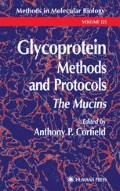Abstract
A successful vaccine for cancer immunotherapy, particularly for solid tumors, would require a suitable target antigen and the production of a cytotoxic T-cell response (1). In the mid- to late-1980s, there was a focus on monoclonal antibodies (MAbs) for the treatment of common cancers, such as those of the colon, breast, and lung. However, with the difficulties of using such agents, there is now a clear focus on cellular immunity for several reasons. First, using genetic engineering techniques, peptide epitopes have been identified and can be produced in large amounts, particularly as synthetic peptides and as recombinant molecules. Second, the description of many cytokines, combined with the knowledge of antigen processing and presentation by class I and class II pathways, has led to a degree of sophistication and knowledge in how to immunize to produce the desired response. These developmets are proving useful in the generation of new and improved vaccines and the future holds much promise for the production of effective vaccines to prevent, control, and possibly eradicate many diseases, including cancer. It is now theoretically possible to induce either antibodies or CTLs to defined polypeptides. However, it remains to be determined which will be the most effective.
Access this chapter
Tax calculation will be finalised at checkout
Purchases are for personal use only
References
Singer A. (1994) News: Time and truth for cancer vaccines-a new generation. J. Natl. Cancer Inst. 86, 330–330.
Dahl A. M., Beverley P. C., and Stauss H. J. (1996) A synthetic peptide derived from the tumor-associated protein mdm2 can stimulate autoreactive, high avidity cytotoxic T lymphocytes that recognize naturally processed protein. J. Immunol. 157, 239–246.
Apostolopoulos V., Haurum J. S., and McKenzie I. F. C. (1997) MUC1 peptide epitopes associated with 5 different H2 Class I molecules. Eur. J. Immunol. 27, 2579–2587.
Apostolopoulos V., Chelvanayagam G., Xing P. X., and McKenzie I. F. L. (1998) AntiMUC1 antibodies react directly with MUC1 peptides presented by Class 1 H2 and HLA molecules. J. Immunol. 161, 767–775.
Barnd D. L., Lan M. S., Metzgar R. S., and Finn O. J. (1989) Specific major histocompatibility complex-unrestricted recognition of tumor associated mucins by human cytotoxic T cells. Proc. Natl. Acad. Sci. USA 86, 7159–7163.
Ioannides C. G., Fisk B., Jerome K. R., Irimura T., Wharton J. T., and Finn O. J.(1993) Cytotoxic T cells from ovarian malignant tumors can recognize polymorphic epithelial mucin core peptides. J. Immunol. 151, 3693–3703.
Apostolopoulos V., Xing P. X., and McKenzie I. F. C. (1994) Murine immune response to cells transfected with human MUC1: immunisation with cellular and synthetic antigens. Cancer Res. 54, 5186–5193.
Xing P. X., Apostolopoulos V., Michaels M., Prenzoska J., Bishop J., and McKenzie I. F. C. (1995) Phase I study of synthetic MUC1 peptides in cancer. Int. J. Oncology 6, 1283–1289.
Acres B., Hareuveni M., Balloul J. M., and Kieny M. P. (1993) VV-MUC1 immunisation of mice-immune response and protection against the growth of murine tumours bearing the MUC1 antigen. J. Immunother. 14, 136–143.
Vitiello A., Marchesini D., Furze J., Sherman L. A., and Chestnut R. W. (1991) Analysis of the HLA-restricted influenza-specific CTL response in transgenic mice carrying a chimeric human-mouse class I MHC molecule. J. Exp. Med. 173, 1007.
Siddiqui J., Abe M., Hayes D., Shani E., Yunis E., and Kufe D. (1988) Isolation and sequencing of a cDNA coding for the human DF3 breast carcinoma-associated antigen. Proc. Natl. Acad. Sci. 85, 2320–2323.
Smith D. B. and Johnson K. S. (1988) Single-step purification of polypeptides expressed in E. coli as fusions with glutathione S-transferase. Gene 67, 31–40.
Apostolopoulos V., Xing P. X., Trapani J. A., and McKenzie I. F. C. (1993) Production of anti-breast cancer monoclonal antibodies using a glutathione-S-transferase-MUC1 bacterial fusion protein. Br. J. Cancer 67, 713–720.
Apostolopoulos V., Pietersz G. A., and McKenzie I. F. C. (1996) Cell-mediated immune responses to MUC1 fusion protein coupled to mannan. Vaccine 14, 930–938.
Pietersz G. A., Wenjun L., Popovski V., Caruana J.-A., Apostolopoulos V., and McKenzie I. F. C. (1998) Parameters in using mannan-fusion protein (MFP) to induce cellular immunity. Cancer Immunol. Immunother., 45, 321–326.
Apostolopoulos V., Loveland B. E., Pietersz G. A., and McKenzie I. F. C. (1995) CTL in mice immunised with human Mucin 1 are MHC-restricted. J. Immunol. 155, 5089–5094.
Apostolopoulos V., Karanikas V., Haurum J., and McKenzie I. F. C. (1997) Induction of HLA-A2 restricted cytotoxic T lymphocytes to the MUC1 human breast cancer antigen. J. Immunol. 159, 5211–5218.
Author information
Authors and Affiliations
Editor information
Editors and Affiliations
Rights and permissions
Copyright information
© 2000 Humana Press Inc.
About this protocol
Cite this protocol
Apostolopoulos, V., McKenzie, I.F.C., Pietersz, G.A. (2000). Generation of MUC1 CytotoxicT-Cells in Mice and Epitope Mapping. In: Corfield, A.P. (eds) Glycoprotein Methods and Protocols. Methods in Molecular Biology™, vol 125. Humana Press. https://doi.org/10.1385/1-59259-048-9:455
Download citation
DOI: https://doi.org/10.1385/1-59259-048-9:455
Publisher Name: Humana Press
Print ISBN: 978-0-89603-720-5
Online ISBN: 978-1-59259-048-3
eBook Packages: Springer Protocols

